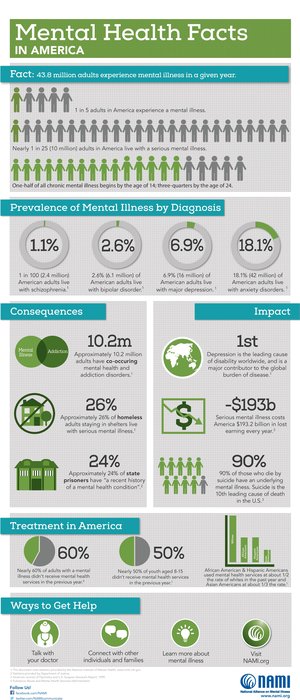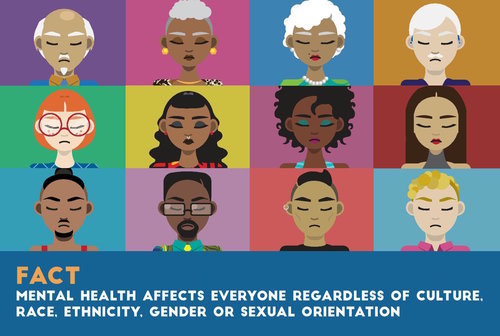Frontline Blog
Combining Disciplines, Reducing Stigma: How Long Beach Incorporates Mental Health into Public Health
May 2017
By Kelly Colopy, MPP, Director, Long Beach Health Department

May is Mental Health Awareness Month, which brings a heightened awareness and opportunity to support the mental and emotional health of those in our communities experiencing a mental illness. As individuals and families, as well as communities and organizations, we are learning that we all know someone, often close to us, who has experienced some level of mental illness in their lifetime. Nearly 1 in 5 adults (43 million) in the United States experiences a mental illness each year. The impacts of mental illness diagnosis vary widely; some have serious impacts on the ability to perform major life activities. Access to treatment has improved with the passage of the Mental Health Parity and Addiction Equity Act of 2008 and under the Affordable Care Act in 2010, yet more capacity for treatment is needed. The conversations are increasing at the systems level as we work to grow healthy supportive environments and increase access to mental health resources in our community. Yet, at an individual and community level, the conversations continue to be difficult. The stigma, while lessened, still remains.
Recognizing the Signs of Mental Illness
Many individuals and families remain unsure about the signs of mental illness and are uncomfortable broaching the subject with those they love. Thankfully, there are many resources available to learn more. For instance, the National Alliance for the Mentally Ill (NAMI) website includes helpful information on how to recognize the signs of a mental illness. These include:

- Feeling excessively sad or low; worry or fear
- Confused thinking or problems concentrating and learning
- Extreme mood changes or prolonged or strong feelings of irritability or anger
- Avoiding friends and social activities
- Changes in sleeping habits or feeling tired and low energy
- Changes in eating habits such as increased hunger or lack of appetite
- Difficulty perceiving reality
- Inability to perceive changes in one’s own feelings, behavior or personality (“lack of insight”)
- Abuse of substances like alcohol or drugs
- Multiple physical ailments without obvious causes (such as headaches, stomach aches, vague and ongoing “aches and pains”)
- Thinking about suicide
- Inability to carry out daily activities or handle daily problems and stress
- An intense fear of weight gain or concern with appearance (mostly in adolescents)
Mental Health First Aid training provides information and practice on how to identify the signs of mental illness and how to hold what may seem like difficult conversations. Learn more about these trainings at: https://www.mentalhealthfirstaid.org/. It’s important to talk from a place of support and trust, staying away from blame.
What are we doing in Long Beach?
While the Long Beach Department of Health and Human Services (LBDHHS) is not considered a mental health service provider, we recognize the importance of integrating mental health supports into our service model as well as encouraging polices and social environments that support mental health. In the past two years, we have integrated mental health counselors into our clinical settings to support those with HIV, and in other programs such as Black Infant Health to provide greater and easier access to support. In addition, the Department partners closely with the Los Angeles County Department of Mental Health (DMH) and many community-based providers to engage people in services, particularly for those experiencing homelessness. The DMH and Mental Health America are co-located at our one-stop Multi-Service Center for the Homeless to ensure expedited access to services. The city is working closely with the DMH to locate a Behavioral Health Urgent Crisis Center (BHUCC) within Long Beach to increase access to mental health services for those in crisis and those involved with law enforcement or emergency services due to their mental illness. We also seek to include prevention/intervention services for those at-risk of losing subsidized housing due to mental illness.

In 2014, the LBDHHS integrated mental health into its strategic plan, officially highlighting the importance of mental wellness to health. At that time, a cross-department subcommittee began work on de-stigmatizing mental illness within the Department and in the community. They developed a campaign called “Healthy Mind, Healthy Me, Healthy LB” and developed trainings, resource guides and post cards to help people connect to resources.
Looking Forward

Mental health, like physical health, would benefit from a stronger population health model. Mental health is often discussed in direct service terms, including treatment, groups, and medication. These are certainly necessary and continuing to increase access to these services is important in a time when resources are not meeting the need. However, it is also important to look upstream and engage in a population health model, to promote physical and social environments that promote mental health. These may include addressing trauma in communities, reducing violence, strengthening parenting and engagement in families, building opportunities for positive relationships and supports, and safe outdoor spaces for outdoor activities and nature, to name a few. These population-focused opportunities, when partnered with the individual-level services, create a powerful combination for promoting mental health in our communities.